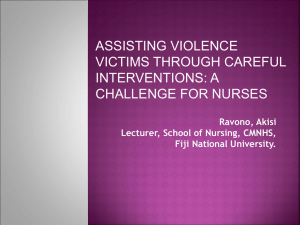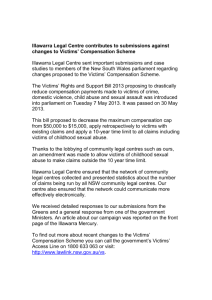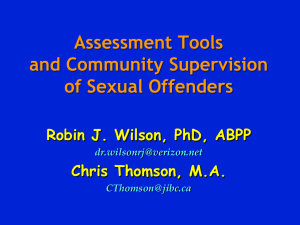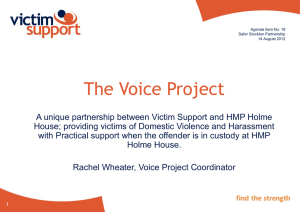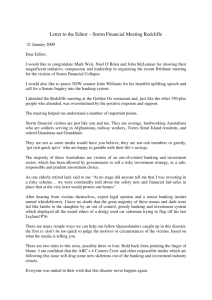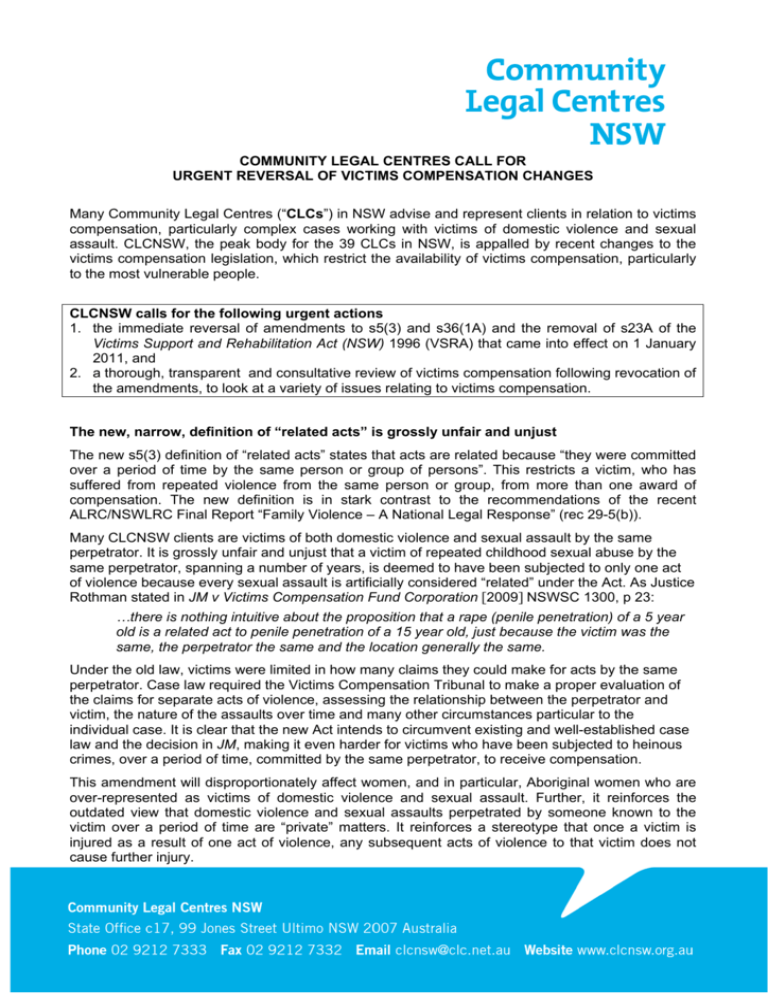
COMMUNITY LEGAL CENTRES CALL FOR
URGENT REVERSAL OF VICTIMS COMPENSATION CHANGES
Many Community Legal Centres (“CLCs”) in NSW advise and represent clients in relation to victims
compensation, particularly complex cases working with victims of domestic violence and sexual
assault. CLCNSW, the peak body for the 39 CLCs in NSW, is appalled by recent changes to the
victims compensation legislation, which restrict the availability of victims compensation, particularly
to the most vulnerable people.
CLCNSW calls for the following urgent actions
1. the immediate reversal of amendments to s5(3) and s36(1A) and the removal of s23A of the
Victims Support and Rehabilitation Act (NSW) 1996 (VSRA) that came into effect on 1 January
2011, and
2. a thorough, transparent and consultative review of victims compensation following revocation of
the amendments, to look at a variety of issues relating to victims compensation.
The new, narrow, definition of “related acts” is grossly unfair and unjust
The new s5(3) definition of “related acts” states that acts are related because “they were committed
over a period of time by the same person or group of persons”. This restricts a victim, who has
suffered from repeated violence from the same person or group, from more than one award of
compensation. The new definition is in stark contrast to the recommendations of the recent
ALRC/NSWLRC Final Report “Family Violence – A National Legal Response” (rec 29-5(b)).
Many CLCNSW clients are victims of both domestic violence and sexual assault by the same
perpetrator. It is grossly unfair and unjust that a victim of repeated childhood sexual abuse by the
same perpetrator, spanning a number of years, is deemed to have been subjected to only one act
of violence because every sexual assault is artificially considered “related” under the Act. As Justice
Rothman stated in JM v Victims Compensation Fund Corporation [2009] NSWSC 1300, p 23:
…there is nothing intuitive about the proposition that a rape (penile penetration) of a 5 year
old is a related act to penile penetration of a 15 year old, just because the victim was the
same, the perpetrator the same and the location generally the same.
Under the old law, victims were limited in how many claims they could make for acts by the same
perpetrator. Case law required the Victims Compensation Tribunal to make a proper evaluation of
the claims for separate acts of violence, assessing the relationship between the perpetrator and
victim, the nature of the assaults over time and many other circumstances particular to the
individual case. It is clear that the new Act intends to circumvent existing and well-established case
law and the decision in JM, making it even harder for victims who have been subjected to heinous
crimes, over a period of time, committed by the same perpetrator, to receive compensation.
This amendment will disproportionately affect women, and in particular, Aboriginal women who are
over-represented as victims of domestic violence and sexual assault. Further, it reinforces the
outdated view that domestic violence and sexual assaults perpetrated by someone known to the
victim over a period of time are “private” matters. It reinforces a stereotype that once a victim is
injured as a result of one act of violence, any subsequent acts of violence to that victim does not
cause further injury.
Exclusion of claims for earlier acts of violence disempowers victims
A new provision precludes victims from making applications for acts of violence that occurred
before a successful compensation claim was filed (in relation to a different act of violence) (s23A).
Victims of sexual assault and child sexual assault are disproportionately negatively impacted by this
change. Many child sexual assault victims experience subsequent domestic violence as adults.
Many of these victims struggle for many years to talk about their experience of sexual violence in
their childhood. If they have made a claim for compensation for a later act of violence, they will be
unable to claim for the earlier sexual violence.
Section 23A actively disempowers victims. It is forcing victims to lodge their applications in
chronological order of the act of violence, despite not being psychologically ready to address the
earlier violence. The law fails to account for the significant research on the healing process for
victims of domestic violence and sexual assault. It is forcing victims to disclose and engage in the
compensation process simultaneously for all of the violence that has been inflicted on them. This is
particularly onerous for victims of domestic violence and sexual assault, who have often
experienced years of abuse and trauma, often by more than perpetrator.
Changes to costs will leave victims without legal assistance
Legal costs paid by Victims Services to the lawyers representing victims compensation claimants
have been reduced, and the right to appeal in relation to costs has been removed. As a result,
private solicitors are ceasing to assist clients in victims’ compensation applications. This will
increase demand upon CLCs which already struggle to meet the demands of clients with complex
victims’ compensation claims. Some victims will be left without legal assistance.
Injustice is caused by restrospectivity of amendments and delays at Victims Services
The amendments do not promote and respect the rights of victims. They exacerbate, not resolve,
deficiencies in victims’ compensation law and process for victims. The retrospectivity of the
amendments (s23A and s5(3)) is particularly abhorrent. Victims with existing claims, in many cases
filed 2 or 3 years ago, have had the law that applies to the determination of their claims changed.
At 1 January 2011 CLCs had numerous matters listed for a determination by an Assessor in
October, November and December 2010. Delays in the Victims Compensation Tribunal (VCT)
meant that these determinations were not made in 2010. These matters will now be assessed in
2011 and the new, narrower, law applies. This will reduce compensation payable to victims of
repeated acts of violence, and may mean some applications, which were valid before 1 January
2011, are now invalid and will not be considered.
Consultation was inadequate
CLCNSW, on behalf of victims, has advocated about the significant problems in victims
compensation for many years. CLCNSW and its members have previously raised concerns about
victims’ compensation policy and practice with Victims Services and the NSW Attorney General and
requested consultation about any changes to victims’ compensation legislation or practice.
In Parliament, the NSW Attorney General stated (Hansard, 30 November 2010):
The Government consulted very carefully over an extended period of time with victims
groups…
However, CLCs and other legal representatives for victims were not consulted prior to amendments
being introduced into Parliament on 24 November 2010. The changes were rushed through
Parliament in six days as part of an omnibus bill.
For more information contact:
Roxana Zulfacar, Advocacy & Human Rights Officer, CLCNSW at roxana_zulfacar@clc.net.au or
on (02) 92127333. 2


